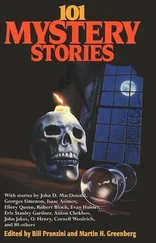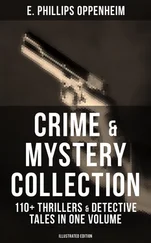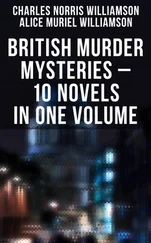'Now, gentlemen, open this door, which will save me the trouble of forcing it. Either put me formally under arrest, or cease to restrict my liberty. I am very much obliged to Mr. Hale for telephoning, and I have made no protest to so gallant a host as Monsieur Valmont is, because of the locked door. However, the farce is now terminated. The proceedings I have sat through were entirely illegal, and if you will pardon me, Mr. Hale, they have been a little too French to go down here in old England, or to make a report in the newspapers that would be quite satisfactory to your chiefs. I demand either my formal arrest, or the unlocking of that door.'
In silence I pressed a button, and my man threw open the door. Macpherson walked to the threshold, paused, and looked back at Spenser Hale, who sat there silent as a sphinx.
'Good-evening, Mr. Hale.'
There being no reply, he turned to me with the same ingratiating smile,—
'Good-evening, Monsieur Eugène Valmont,' he said, 'I shall give myself the pleasure of calling next Wednesday at six for my five shillings.'
The Ghost with the Club-Foot
Table of Contents
Celebrated critics have written with scorn of what they call 'the long arm of coincidence' in fiction. Coincidence is supposed to be the device of a novelist who does not possess ingenuity enough to construct a book without it. In France our incomparable writers pay no attention to this, because they are gifted with a keener insight into real life than is the case with the British. The superb Charles Dickens, possibly as well known in France as he is wherever the English language is read, and who loved French soil and the French people, probably probed deeper into the intricacies of human character than any other novelist of modern times, and if you read his works, you will see that he continually makes use of coincidence. The experience that has come to me throughout my own strange and varied career convinces me that coincidence happens in real life with exceeding frequency, and this fact is especially borne in upon me when I set out to relate my conflict with the Rantremly ghost, which wrought startling changes upon the lives of two people, one an objectionable, domineering man, and the other a humble and crushed woman. Of course, there was a third person, and the consequences that came to him were the most striking of all, as you will learn if you do me the honour to read this account of the episode.
So far as coincidence is concerned, there was first the arrival of the newspaper clipping, then the coming of Sophia Brooks, and when that much-injured woman left my flat I wrote down this sentence on a sheet of paper:—
'Before the week is out, I predict that Lord Rantremly himself will call to see me.'
Next day my servant brought in the card of Lord Rantremly.
I must begin with the visit of Sophia Brooks, for though that comes second, yet I had paid no attention in particular to the newspaper clipping until the lady told her story. My man brought me a typewritten sheet of paper on which were inscribed the words:—
'Sophia Brooks, Typewriting and Translating Office, First Floor, No. 51 Beaumont Street, Strand, London, W.C.'
I said to my servant,—
'Tell the lady as kindly as possible that I have no typewriting work to give out, and that, in fact, I keep a stenographer and typewriting machine on the premises.'
A few moments later my man returned, and said the lady wished to see me, not about typewriting, but regarding a case in which she hoped to interest me. I was still in some hesitation about admitting her, for my transactions had now risen to a higher plane than when I was new to London. My expenses were naturally very heavy, and it was not possible for me, in justice to myself, to waste time in commissions from the poor, which even if they resulted successfully meant little money added to my banking account, and often nothing at all, because the client was unable to pay. As I remarked before, I possess a heart the most tender, and therefore must greatly to my grief, steel myself against the enlisting of my sympathy, which, alas! has frequently led to my financial loss. Still, sometimes the apparently poor are involved in matters of extreme importance, and England is so eccentric a country that one may find himself at fault if he closes his door too harshly. Indeed, ever since my servant, in the utmost good faith, threw downstairs the persistent and tattered beggar-man, who he learned later to his sorrow was actually his Grace the Duke of Ventnor, I have always cautioned my subordinates not to judge too hastily from appearances.
'Show the lady in,' I said, and there came to me, hesitating, backward, abashed, a middle-aged woman, dressed with distressing plainness, when one thinks of the charming costumes to be seen on a Parisian boulevard. Her subdued manner was that of one to whom the world had been cruel. I rose, bowed profoundly, and placed a chair at her disposal, with the air I should have used if my caller had been a Royal Princess. I claim no credit for this; it is of my nature. There you behold Eugène Valmont. My visitor was a woman. Voilà!
'Madam,' I said politely, 'in what may I have the pleasure of serving you?'
The poor woman seemed for the moment confused, and was, I feared, on the verge of tears, but at last she spoke, and said,—
'Perhaps you have read in the newspapers of the tragedy at Rantremly Castle?'
'The name, madam, remains in my memory, associated elusively with some hint of seriousness. Will you pardon me a moment?' and a vague thought that I had seen the castle mentioned either in a newspaper, or a clipping from one, caused me to pick up the latest bunch which had come from my agent. I am imbued with no vanity at all; still it is amusing to note what the newspapers say of one, and therefore I have subscribed to a clipping agency. In fact, I indulge in two subscriptions—one personal; the other calling for any pronouncement pertaining to the differences between England and France; for it is my determination yet to write a book on the comparative characteristics of the two people. I hold a theory that the English people are utterly incomprehensible to the rest of humanity, and this will be duly set out in my forthcoming volume.
I speedily found the clipping I was in search of. It proved to be a letter to the Times , and was headed: 'Proposed Destruction of Rantremly Castle'. The letter went on to say that this edifice was one of the most noted examples of Norman architecture in the north of England; that Charles II had hidden there for some days after his disastrous defeat at Worcester. Part of the castle had been battered down by Cromwell, and later it again proved the refuge of a Stuart when the Pretender made it a temporary place of concealment. The new Lord Rantremly, it seemed, had determined to demolish this ancient stronghold, so interesting architecturally and historically, and to build with its stones a modern residence. Against this act of vandalism the writer strongly protested, and suggested that England should acquire the power which France constantly exerts, in making an historical monument of an edifice so interwoven with the fortunes of the country.
'Well, madam,' I said, 'all this extract alludes to is the coming demolition of Rantremly Castle. Is that the tragedy of which you speak?'
'Oh no,' she exclaimed; 'I mean the death of the eleventh Lord Rantremly about six weeks ago. For ten years Lord Rantremly lived practically alone in the castle. Servants would not remain there because the place was haunted, and well it may be, for a terrible family the Rantremlys have been, and a cruel, as I shall be able to tell you. Up to a month and a half ago Lord Rantremly was waited on by a butler older than himself, and if possible, more wicked. One morning this old butler came up the stairs from the kitchen, with Lord Rantremly's breakfast on a silver tray, as was his custom. His lordship always partook of breakfast in his own room. It is not known how the accident happened, as the old servant was going up the stairs instead of coming down, but the steps are very smooth and slippery, and without a carpet; at any rate, he seems to have fallen from the top to the bottom, and lay there with a broken neck. Lord Rantremly, who was very deaf, seemingly did not hear the crash, and it is supposed that after ringing and ringing in vain, and doubtless working himself into a violent fit of temper—alas! too frequent an occurrence—the old nobleman got out of bed, and walked barefooted down the stair, coming at last upon the body of his ancient servant. There the man who arrived every morning to light the fires found them, the servant dead, and Lord Rantremly helpless from an attack of paralysis. The physicians say that only his eyes seemed alive, and they were filled with a great fear, and indeed that is not to be wondered at, after his wicked, wicked life. His right hand was but partially disabled, and with that he tried to scribble something which proved indecipherable. And so he died, and those who attended him at his last moments say that if ever a soul had a taste of future punishment before it left this earth, it was the soul of Lord Rantremly as it shone through those terror-stricken eyes.'
Читать дальше












